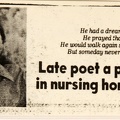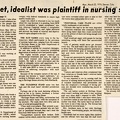Rocky Mountain News Mon., March 22, 1976, Denver, Colo.
Banner Headline for story.
PHOTO on left of headline: Head and shoulders shot of a young man (Michael Smith) with dark hair, pulled back in ponytail, dark beard and moustache. His head is tilted slightly to one side and he is smiling a bit. Caption reads: Michael Smith.
He had a dream;
He prayed that
He would walk again someday.
But someday never came.
[Headline] Late poet a plaintiff in nursing home case
Page 5
[Banner headline in ADAPT 44. Story starts here in ADAPT 45 and continues in ADAPT 46, but the entire text is included here for ease of reading.]
Late poet was plaintiff in nursing home lawsuit
By Jonathan Dedmon, News Staff
Michael Smith was a poet.
A victim of muscular dystrophy, Michael wasn't able to hold a pen, however. Weighing less than 100 pounds, one of the few physical tasks he was able to perform was to turn the pages of the many books he read.
He would keep stanzas of poetry stored in his head and wait for friends or staff at the Heritage House Nursing Home in Lakewood where he lived to have free time so he could dictate his verse.
A former aide remembers when she would be busy caring for patients and Mike would say, "Got to write."
"We'd say, ‘Sorry, Mike‘ Don‘t have time.‘ A lot of his poetry was lost."
In addition to being a poet, Mike also was an idealist.
Because of what friends say was that idealism, in spite of the fact Mike died in October at the age of 21, he lives on not only in a published book of his poems but also in a giant legal battle in U.S. District Court.
THE BATTLE COULD have a large impact on the care of handicapped patients in nursing homes throughout the country since it attacks the entire method of delivering health care.
The suit, in which Mike was an original plaintiff, charges nursing home patients routinely are being denied their rights and even fundamental medical care, contrary to the wishes of Congress in its Medicaid law.
U.S. Judge Richard Matsch currently is considering how much jurisdiction the federal court has in the case. But already a number of patients and nursing home employees have come forward with a series of affidavits which are a litany of patient abuse.
The charges are leveled primarily against the former Heritage House Nursing Center in Lakewood, which since has been sold and is operating under new management and a new name.
The suit’s allegations range from patients not having the colostomy bags changed to failure of the staff to provide any rehabilitation efforts.
THE NURSING HOME attorney and a part owner deny the charges which are contained in a half dozen affidavits filed with the court.
Pam Malpass worked as an aide from August 1974 to February of last year.
Here are parts of her affidavit:
“People were punished sometimes by having their wheelchairs turned off, cut their mobility (sic). Wheelchairs at Heritage House were constantly in disrepair and falling apart leading to weekly crises.
Paul Brae, a Heritage House resident, fell out of his chair because it was falling apart and crawled under his bed and said he was (sic) [not] going to come out until he got a new wheelchair [cut off] we procured for him with some difficulty.
Bowel programs for a number of residents weren't maintained properly resulting in infections. Colostomies and catheters weren't cleaned properly or regularly also resulting in infections for a number of patients. I also often observed that colostomy bags and catheters improperly were connected to the people that needed them with the result that they leaked and backed up."
Michael Ray, an orderly from May 1974 to January of last year, said in his affidavit that on at least a dozen occasions, he made marks with a felt-tipped pen on patients’ dressings on open bed sores to make sure they were being changed twice a day as they should have been.
“Each time when I looked, a day later, sometimes longer, the dressings I had put on with the markings were still there. The unclean sores lead to more serious complications and infections. During the six months I was working at Heritage House I never saw a doctor."
FAILURE TO MAINTAIN a bowel program can lead to bowel poisoning and even to surgery. Mark Biles was impacted for three weeks while I was there necessitating an elaborate program of oral laxatives, suppositories and enemas to give him relief.
The owners and the administrators always met suggestions or requests from the staff on behalf of patients residing there with the remark that they cost too much or if you don't like it why don't you get the hell out.
“The only time that Heritage House was concemed about the cleanliness of the home was when the state inspection team announced it would appear.”
ACCORDING TO JOHN Holland, who heads a team of Legal Aid attorneys working on the case, “We're saying that when Congress established Medicaid, it intended to create a real system of delivering high quality medical care to poor people, not a system that couldn't deliver for a significant number. The benefits aren't getting there.”
A particular target is the U.S. Department of Health, Education and Welfare (HEW), which is charged with making sure nursing homes comply with federal standards to insure high quality health care.
Legal Aid, which is reluctant to say too much about the case because it is pending, feels HEW merely established a “paper compliance" system whereas Congress wanted a compliance system to “see benefits and rights delivered and prevent the kinds of injuries and deprivations of rights alleged in the suit."
THE SUIT NAMES every rung in the bureaucracy which participates in the provision of nursing home care, ranging from the owners of Heritage House to the state Department of Social Services and HEW.
In addition to asking for monetary damages, the suit also seeks an injunction prohibiting deprivation of medical care and patient rights.
The rights include proper medical and psychosocial treatment and care, the right to seek legal counsel and manage personal monies, the right to voice grievances and the right to adequate notice and opportunity for a hearing prior to transfer, among others.
It also asks HEW to come up with a decent system of enforcing compliance with such federal laws.
Because of the complex nature of the suit, it already has become a “paper nightmare," according to Holland, and a “paper war,“ according to Heritage House attomey Bob Eberhardt.
THE PLEADINGS STAND some two feet high and the court hasn't decided jurisdiction yet.
Perhaps one of the most damning affidavits filed so far is by Janice Jacobson, a former administrator of Heritage House.
“Heritage House was filthy, cockroaches had infested the entire home (with the exception of the kitchen). The walls wene very dirty and an odor of urine permeated the air.
“Flies were everywhere. They present a particular problem to those persons who are bedfast or paralyzed because they can't swat the flies from their faces or bodies.
“Temperature controls were broken. Zone control valves which control the room temperature were corroded either open or shut so that the rooms were unbearably hot or cold.
“INDIVIDUAL CARE PLANS are either totally inadequate or not existent."
“Patients who had to be fed were degraded by impatient orderlies who constantly hurried them along faster than they could comfortably go on the pretext of there not being enough time to feed them."
“Staff would get angry with people for having something wrong with them like uncontrolled bowels."
“Lots of patients would never get dressed every day. The staff didn’t like to take the time to dress them. By keeping patients undressed a general institutional goal of keeping them in bed and more inactive was more readily achieved.
“It was not uncommon for people who did get dressed to not be undressed but rather to sleep in their clothes. l received complaints from one family that one of the male patients there had the same clothes on for weeks. They knew because the same spot was on his shirt for three weeks."
“Visitors and relatives often complained that their relatives or friends hadn't received baths or showers for weeks."
“It was reported to me by nursing staff the director of nursing believed physical correction of resident misconduct was permissible and that she employed a technique of having persons she decided were misbehaving placed in cold showers."
“The call button system at Heritage House often wasn't working and when it was, working staff very often didn't respond to calls. There was one incident while I was there where family members called in and said they heard their mother was dead. The nurse had to go down to the room to see if this was so. The woman had been dead for several hours."
Mrs. Jacobson says, in her view, Heritage House was “warehousing people, not delivering health care."
"Residents had no more rights than children and the official view was that the staff knew what was best for them and if the patients didn't think we were doing everything right or what they needed they could just leave." Management expressed this view often.
“PATIENTS WERE KEPT tractable and quiescent by intimidation and medication. Encouraging people to be as normal as they can be is the essence of good nursing care. It was not done at Heritage House.“
In response, Heritage House attorney Eberhardt said the accusations are “totally untrue and completely without foundation. You can't cross-examine affidavits. The truth will come out in the trial. “
He also points to the affidavit of Allen Buckingham, regional director of the HEW office of Long Term Care Standards Enforcement.
Buckingham stated his office never received any complaints concerning the allegations.
Oscar Gross, former part owner and also a defendant, said he never would have been able to keep his license if the allegations were true.
In addition, he said his home was the only home to provide a wing specifically for handicapped youths and he even received two awards from the wing.
“We tried to do our best," he said. He also offered to take the News to the home to interview patients about conditions.
He said his wife still visits patients.
Gross sold the home in February and it now is under new management. Gross said he sold the home simply as “a business transaction.“
Before Michael Smith died last year, he testified at one hearing on the case.
“He already felt he had won," recalled Mrs. Malpass.
- Created on
- Wednesday 10 July 2013
- Posted on
- Saturday 20 February 2016
- Tags
- abuse, Atlantis Community, civil rights, CO Dept. of Social Services, cockroaches, flies, Heritage House, HEW - Health Education and Welfare Dept., Janice Jacobson, John Holland, lawsuit, Legal Aid, Mark Biles, Medicaid, Michael Ray, Mike Smith, nursing home, obituary, Pam Malpass, patients' rights, Paul Brae, physical punishment, poems, smell of urine, Wade Blank, warehousing
- Albums
- Visits
- 5461
- Rating score
- no rate
- Rate this photo


0 comments